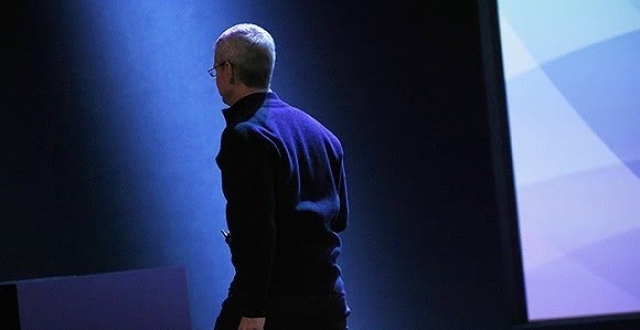庫克:技術帶來的危機是真實的 | 雙語閱讀
鄭慧 | 文

近幾年,Facebook、谷歌等互聯網巨頭紛紛因為不當使用用戶數據,破壞隱私安全等醜聞而陷入輿論風波。10月24日,蘋果CEO庫克在布魯塞爾(歐盟總部所在地)發表了關於隱私與數據安全問題的演講,在表達支持歐盟隱私保護政策的同時,他也強調,蘋果公司將始終堅持尊重用戶隱私的傳統。
回顧今年上半年,Facebook幾度陷入醜聞。2月,負責俄羅斯干擾美國總統大選的調查員指控13名俄羅斯人使用Facebook、Twitter和Instagram干涉大選,通過花錢投放中傷希拉裡的廣告來響選民的投票決定。3月,據《紐約時報》報導,有研究人員獲得Facebook用戶的個人資訊,並將其出售給川普和共和黨雇用的谘詢公司劍橋分析,而這家機構則通過使用過使用橋分析,而這家機。
事實上,早在2016年大選時,就有人指控Facebook被用於傳播不實資訊,釋放政治誘餌。而《紐約客》的一篇文章則指出,Facebook早在2015年12月就已經發現了這個問題,但卻一直保持沉默,只是在媒體曝光之後才站出來承認了這件事。
接連的醜聞使得Facebook的股價大跌,市值一度縮水千億美元。與此同時,政府也在加強對這些互聯網巨頭的監管和懲罰。
為了保護數據隱私,歐盟於今年5月25日起正式實施《通用數據保護條例》(GDPR)。這個被譽為“史上最嚴”的隱私保護法案規定,違反者將被罰以至少1000萬歐元或企業上一財年全球營業總額的2%—4%,且以較高者為準。
而庫克此次正是受邀赴歐參加數據隱私主題的國際會議。在發言中,他極力讚揚歐盟的新規,並表達了蘋果公司保護用戶數據隱私的決心。
以下為庫克演講的摘譯:
Around the world, from Copenhagen to Chennai to Cupertino, new technologies are driving breakthroughs in humanity’s greatest common projects。 From preventing and fighting disease…To curbing the effects of climate change…To ensuring every person has access to information and economic opportunity。
在世界各地,從哥本哈根到金奈到庫比蒂諾,新技術正在推動人類最偉大的共同項目取得突破。從預防和對抗疾病,到控制氣候變化的影響,再到確保每個人都能獲得資訊和經濟機會。
At the same time, we see vividly—painfully—how technology can harm rather than help。 Platforms and algorithms that promised to improve our lives can actually magnify our worst human tendencies。 Rogue actors and even governments have taken advantage of user trust to deepen divisions, incite violence, and even undermine our shared sense of what is true and what is false。
與此同時,我們也看到了技術是如何帶來傷害而不是幫助,這是非常痛苦的。承諾改善我們生活的平台和算法實際上放大了我們最壞的人性傾向。流氓行為者甚至政府正在利用用戶信任加深分歧,煽動暴力,甚至破壞我們對何為真假的共識。
This crisis is real。 It is not imagined, or exaggerated, or “crazy。” And those of us who believe in technology’s potential for good must not shrink from this moment.Now, more than ever — as leaders of governments, as decision-makers in business, and as citizens — we must ask ourselves a fundamental question: What kind of world do we want to live in?
這場危機是真實的。它不是想象出來的,不是誇張的,也不是“瘋狂的”。“我們當中那些相信科技有潛力帶來好處的人,不能在這一刻退縮。現在,作為政府長官人、商界決策者和公民,我們比以往任何時候都更必須問自己一個根本問題:我們希望生活在一個什麽樣的世界?
I‘m here today because we hope to work with you as partners in answering this question.At Apple, we are optimistic about technology’s awesome potential for good。 But we know that it won’t happen on its own。 Every day, we work to infuse the devices we make with the humanity that makes us。 As I’ve said before, “Technology is capable of doing great things。 But it doesn’t want to do great things。 It doesn’t want anything。 That part takes all of us。
我今天來到這裡,是因為我們希望與你們一起,共同回答這個問題。在蘋果,我們對科技的巨大潛力持樂觀態度。但我們知道,這不會自行發生。每一天,我們都在努力將我們製造的設備與製造我們的人性融合在一起。正如我之前說過的,“技術可以做偉大的事情,但它不會想去做偉大的事情。它不想要任何東西。這一部分佔據了我們所有人。”
That’s why I believe that our missions are so closely aligned。 As Giovanni puts it, “We must act to ensure that technology is designed and developed to serve humankind, and not the other way around.We at Apple believe that privacy is a fundamental human right。 But we also recognize that not everyone sees things as we do。 In a way, the desire to put profits over privacy is nothing new。
這就是為什麽我認為我們的使命是如此緊密地結合在一起。正如喬瓦尼所說,“我們必須采取行動,確保技術的設計和開發是為了服務人類,而不是反過來。”我們蘋果公司認為隱私是一項基本人權。但我們也認識到,並不是每個人都像我們一樣看待事物。在某種程度上,將利潤置於隱私之上的願望並不是什麽新鮮事。
As far back as 1890, future Supreme Court Justice Louis Brandeis published an article in the Harvard Law Review, making the case for a “Right to Privacy” in the United States。 He warned: “Gossip is no longer the resource of the idle and of the vicious, but has become a trade。” Today that trade has exploded into a data industrial complex。 Our own information, from the everyday to the deeply personal, is being weaponized against us
早在1890年,未來的最高法院大法官路易斯o布蘭迪斯(Louis Brandeis)就在《哈佛法律評論》(Harvard Law Review)上發表了一篇文章,為美國的“隱私權”辯護。他警告說:“流言蜚語不再是懶漢和惡人的資源,而是一種交易。”如今,這一行業已迅速發展成為一個數據產業綜合體。我們自己的資訊,從日常生活到個人生活,都在以軍事效率變成對付我們的武器。
Every day, billions of dollars change hands, and countless decisions are made, on the basis of our likes and dislikes, our friends and families, Our relationships and conversations…Our wishes and fears…Our hopes and dreams。 These scraps of data…each one harmless enough on its own…are carefully assembled, synthesized, traded, and sold。
每天,數十億美元被交易,無數的決定被做出,這些決定基於我們的好惡,我們的朋友和家人,我們的關係和談話,我們的願望和恐懼,我們的希望和夢想。”這些零碎的數據,每一個單獨來看似乎都不足為害,都經過仔細組裝、合成、交易和出售。
Taken to its extreme, this process creates an enduring digital profile and lets companies know you better than you may know yourself。 Your profile is then run through algorithms that can serve up increasingly extreme content, pounding our harmless preferences into hardened convictions。 If green is your favorite color, you may find yourself reading a lot of articles—or watching a lot of videos—about the insidious threat from people who like orange.In the news, almost every day, we bear witness to the harmful, even deadly, effects of these narrowed world views。
從極端的角度看,這個過程創造了一個持久的數字檔案,讓公司更好地了解你,甚至比你自己更了解。然後,你的個人資料將通過算法運行,算法會為你提供越來越極端的內容,把我們無害的偏好變成堅定的信念。如果綠色是你最喜歡的顏色,你可能會發現自己讀了很多關於喜歡橙色的人的潛在威脅的文章,或者看了很多類似的影片。在新聞中,幾乎每一天,我們都見證了這些狹隘世界觀的有害甚至致命的影響。
We shouldn’t sugarcoat the consequences。 This is surveillance。 And these stockpiles of personal data serve only to enrich the companies that collect them。
我們不應該粉飾後果。這是監視。而這些被儲存的個人數據只會讓收集這些數據的公司從中獲利。
This should make us very uncomfortable。 It should unsettle us。 And it illustrates the importance of our shared work and the challenges still ahead of us。
這會讓我們非常不舒服,使我們不安。它表明了擺在我們面前的挑戰以及共同努力的重要性。
Fortunately, this year, you’ve shown the world that good policy and political will can come together to protect the rights of everyone。 We should celebrate the transformative work of the European institutions tasked with the successful implementation of the GDPR。 We also celebrate the new steps taken, not only here in Europe, but around the world。 In Singapore, Japan, Brazil, New Zealand, and many more nations, regulators are asking tough questions and crafting effective reforms.It is time for the rest of the world—including my home country—to follow your lead。
幸運的是,今年,你們(歐盟)向世界展示了良好的政策和政治意願能夠共同保護每個人的權利。我們應該慶祝歐洲機構為成功實施GDPR而進行的改革工作。我們還慶祝不僅在歐洲,而且在全世界采取的新步驟。在新加坡、日本、巴西、紐西蘭和其他許多國家,監管機構正在提出尖銳的問題,並制定有效的改革方案。是時候讓全世界,包括我的祖國,跟隨你們的腳步了。
We at Apple are in full support of a comprehensive federal privacy law in the United States。 There, and everywhere, it should be rooted in four essential rights: First, the right to have personal data minimized。 Companies should challenge themselves to de-identify customer data—or not to collect it in the first place。 Second, the right to knowledge。 Users should always know what data is being collected and what it is being collected for。 This is the only way to empower users to decide what collection is legitimate and what isn’t。 Anything less is a sham。 Third, the right to access。 Companies should recognize that data belongs to users, and we should all make it easy for users to get a copy of…correct…and delete their personal data。 And fourth, the right to security。 Security is foundational to trust and all other privacy rights。
蘋果公司完全支持美國全面的聯邦隱私法。無論在哪裡,它都應該植根於四項基本權利:第一,最小化個人數據的權利。企業應該挑戰自己,反識別客戶數據,或者一開始就不收集。第二,知情權。用戶應該始終知道哪些數據被收集以及收集這些數據的目的是什麽。這是授權用戶決定哪些收集合法而哪些不合法的唯一方法。任何告知的不足都是一種欺騙。第三,使用權。公司應該認識到數據是屬於用戶的,我們應該讓用戶很容易拷貝、修正並刪除他們的個人數據。第四,保障權。安全是信任和其他所有隱私權的基礎。
Now, there are those who would prefer I hadn’t said all of that。 Some oppose any form of privacy legislation。 Others will endorse reform in public, and then resist and undermine it behind closed doors。 They may say to you, ‘our companies will never achieve technology’s true potential if they are constrained with privacy regulation。’ But this notion isn’t just wrong, it is destructive。
現在,有些人更希望我不要說出這些。一些人反對任何形式的隱私立法。另一些人會在公開場合支持改革,然後在私下裡抵製並破壞它。他們可能會對你說,“如果我們的公司受到隱私監管的約束,就永遠無法實現技術的真正潛力。”但這種想法不僅是錯誤的,而且是破壞性的。
Technology’s potential is, and always must be, rooted in the faith people have in it…In the optimism and creativity that it stirs in the hearts of individuals…In its promise and capacity to make the world a better place.It’s time to face facts。 We will never achieve technology’s true potential without the full faith and confidence of the people who use it。
科技的潛力植根於人們對它的信仰,根植於它在個人心中激起的樂觀和創造力,根植於它使世界變得更美好的承諾和能力。是時候面對現實了。如果沒有用戶的充分信任和信心,我們永遠無法實現技術的真正潛力。
At Apple, respect for privacy—and a healthy suspicion of authority—have always been in our bloodstream。 Our first computers were built by misfits, tinkerers, and rebels—not in a laboratory or a board room, but in a suburban garage。 We introduced the Macintosh with a famous TV ad channeling George Orwell‘s 1984—a warning of what can happen when technology becomes a tool of power and loses touch with humanity。
在蘋果,尊重隱私,以及對權威的一種健康的懷疑,一直存在於我們的血液中。我們的第一台電腦是由不適應環境的人、工匠和叛逆者製造的——不是在實驗室或會議室裡,而是在郊區的車柯瑞。我們1984年為麥金塔電腦 (Macintosh)所做的著名電視廣告借用了喬治·奧威爾(George Orwell)的隱喻,這是對技術成為權力工具、與人類失去聯繫的後果的警告。
And way back in 2010, Steve Jobs said in no uncertain terms: “Privacy means people know what they’re signing up for, in plain language, and repeatedly。”
早在2010年,史蒂夫o喬布斯(Steve Jobs)就曾明確表示:“隱私意味著人們知道自己在注冊什麽,(企業應該)用直白的語言,而且反覆提示(用戶)。”
It’s worth remembering the foresight and courage it took to make that statement。 When we designed this device we knew it could put more personal data in your pocket than most of us keep in our homes。 And there was enormous pressure on Steve and Apple to bend our values and to freely share this information。 But we refused to compromise。 In fact, we’ve only deepened our commitment in the decade since。
值得記住的是,做出這樣的聲明需要遠見和勇氣。當我們設計這個設備(iphone)的時候,我們知道它可以把詳盡的個人數據放進你的口袋裡。史蒂夫和蘋果承受著巨大的壓力,我們被要求改變價值觀,自由地分享這些資訊。但我們拒絕妥協。事實上,從那以後的十年裡,我們的承諾不斷深化。
From hardware breakthroughs…that encrypt fingerprints and faces securely—and only—on your device。。。To simple and powerful notifications that make clear to every user precisely what they’re sharing and when they are sharing it。
從硬體上的突破,比如加密指紋和面部的安全,到簡單而有效的通知,讓每個用戶都清楚地知道他們在共享什麽以及什麽時候共享它。
We aren’t absolutists, and we don’t claim to have all the answers。 Instead, we always try to return to that simple question: What kind of world do we want to live in。
我們不是絕對論者,我們也不自稱有全部答案。相反,我們總是試圖回到那個簡單的問題:我們想要生活在什麽樣的世界裡?
At every stage of the creative process, then and now, we engage in an open, honest, and robust ethical debate about the products we make and the impact they will have。 That’s just a part of our culture。 We don’t do it because we have to, we do it because we ought to。 The values behind our products are as important to us as any feature。
在創意的每一個階段,不論是過去還是現在,我們都會進行一場公開、誠實、有力的道德辯論,討論我們生產的產品及其將產生的影響。這只是我們文化的一部分。我們這麽做不是因為我們必須這麽做,而是因為我們應該這麽做。我們產品背後的價值觀對我們來說和任何(產品)特性一樣重要。
We understand that the dangers are real—from cyber-criminals to rogue nation states。 We’re not willing to leave our users to fend for themselves。 And, we‘ve shown, we’ll defend those principles when challenged。 Those values…that commitment to thoughtful debate and transparency…they’re only going to get more important。 As progress speeds up, these things should continue to ground us and connect us, first and foremost, to the people we serve。
我們知道,從網絡罪犯到流氓國家,危險是真實存在的。我們不願意讓我們的用戶自謀生路。我們已經證明,當這些原則受到挑戰時,我們會捍衛它們。這些價值觀,這些對深思熟慮的辯論和透明度的承諾,只會變得越來越重要。隨著進步速度的加快,這些東西應該繼續根植於我們,並首先將我們與我們所服務的人聯繫起來。
Artificial Intelligence is one area I think a lot about。 Clearly, it‘s on the minds of many of my peers as well。 At its core, this technology promises to learn from people individually to benefit us all。 Yet advancing AI by collecting huge personal profiles is laziness, not efficiency。 For Artificial Intelligence to be truly smart, it must respect human values, including privacy.If we get this wrong, the dangers are profound。 We can achieve both great Artificial Intelligence and great privacy standards。 It’s not only a possibility, it is a responsibility.In the pursuit of artificial intelligence, we should not sacrifice the humanity, creativity, and ingenuity that define our human intelligence。 And at Apple, we never will。
人工智能是我經常思考的一個領域。很明顯,我的很多同齡人都有這樣的想法。這項技術的核心是向個人學習,讓我們所有人受益。然而,通過收集大量個人資料來提升人工智能是一種懶惰,而非效率。人工智能要想真正聰明,就必須尊重人類的價值觀,包括隱私。如果我們弄錯了,危險將是深遠的。我們可以實現偉大的人工智能和偉大的隱私標準。這不僅是一種可能性,也是一種責任。在追求人工智能的過程中,我們不應該犧牲定義人類智能的人性、創造力和獨創性。而在蘋果,我們永遠不會。
In the mid-19th Century, the great American writer Henry David Thoreau found himself so fed up with the pace and change of Industrial society that he moved to a cabin in the woods by Walden Pond。 Call it the first digital cleanse。 Yet even there, where he hoped to find a bit of peace, he could hear a distant clatter and whistle of a steam engine passing by。 “We do not ride on the railroad,” he said。 “It rides upon us”。Those of us who are fortunate enough to work in technology have an enormous responsibility。 It is not to please every grumpy Thoreau out there。 That’s an unreasonable standard, and we’ll never meet it。
19世紀中葉,偉大的美國作家亨利·戴維·梭羅(Henry David Thoreau)發現自己對工業社會的節奏和變化感到厭倦,於是搬到了瓦爾登湖(Walden Pond)旁的樹林裡的一間小木屋,稱之為第一次數字化淨化。即使在那裡,他也能聽到遠處傳來汽笛聲。“我們不乘坐鐵路,”他說。“它騎在我們身上。”我們這些有幸從事技術工作的人肩負著巨大的責任。這並不是要取悅所有脾氣暴躁的梭羅。這是不合理的標準,我們永遠也達不到。
We are responsible, however, for recognizing that the devices we make and the platforms we build have real…lasting…even permanent effects on the individuals and communities who use them。 We must never stop asking ourselves…What kind of world do we want to live in?
然而,我們有責任認識到,我們製造的設備和平台對使用它們的個人和社區具有真正持久,甚至永久的影響。我們必須不斷地問自己,我們想要生活在什麽樣的世界裡?
The answer to that question must not be an afterthought, it should be our primary concern。 We at Apple can—and do—provide the very best to our users while treating their most personal data like the precious cargo that it is。 And if we can do it, then everyone can do it。
這個問題的答案不應該是事後才想出來的,它應該是我們主要關心的問題。蘋果可以,也確實做到了——為我們的用戶提供最好的服務,同時把他們的個人數據當作珍貴的事物對待。如果我們能做到,那麽每個人都能做到。
Fortunately, we have your example before us。 Thank you for your work…For your commitment to the possibility of human-centered technology…And for your firm belief that our best days are still ahead of us。
幸運的是,我們面前有你們(歐盟)作為榜樣。感謝你們的工作,感謝你們對以人為中心的技術的可能性的承諾,感謝你們堅信我們最好的日子還在前面。
Thank you very much。
非常感謝。
作者為《財經》實習生









